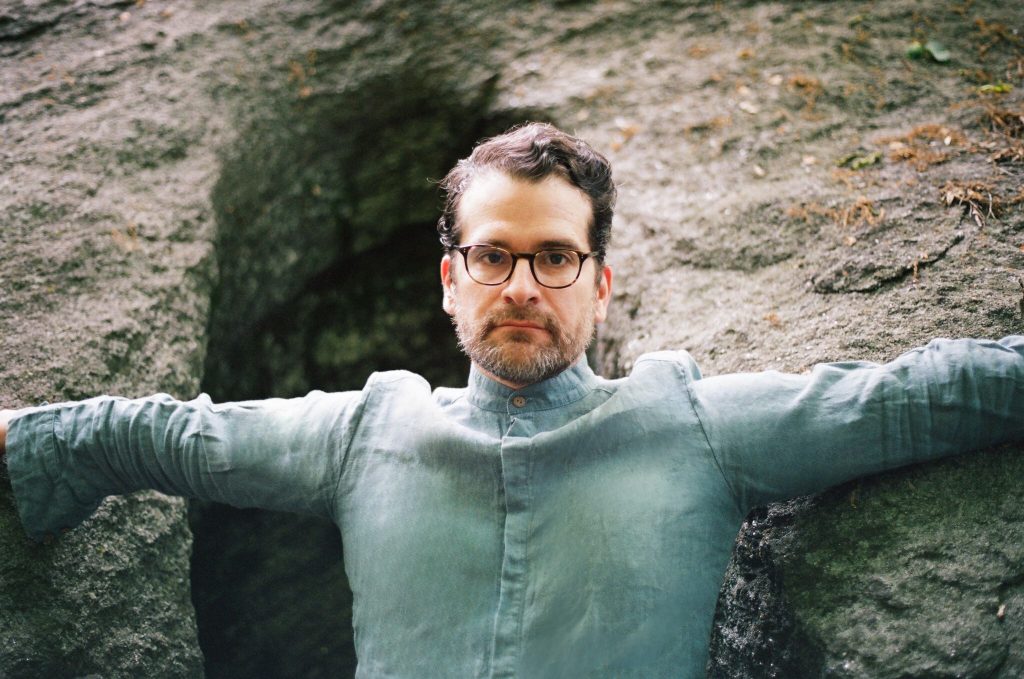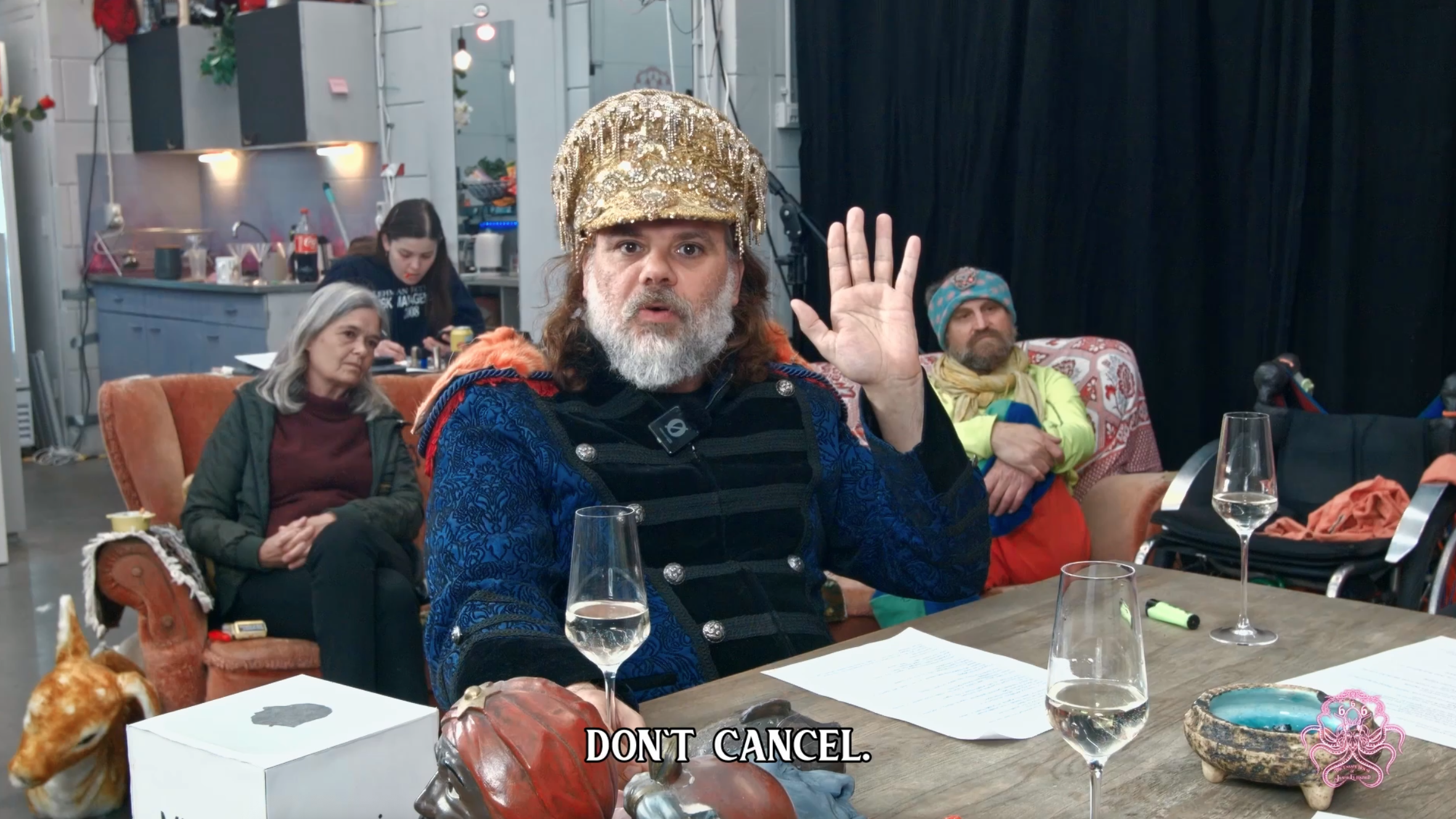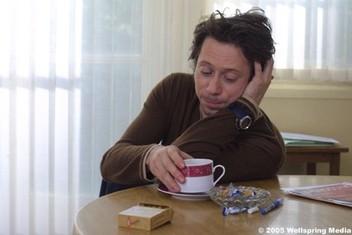By his own admission, Carlos Dengler suffers from ‘creative ADHD’. It’s a condition he says makes him miserable, which I can understand. On the plus though, it is a side of his nature, given the quality and quantity of his creative output, I would argue that has been put to tremendous use over the years. Carlos Dengler has proven himself as a multi-instrumentalist, composer, writer of essays, and over the past few years, a respected screen and stage actor in his own right.
I dare say many readers here will be well familiar with the name ‘Carlos D’, the former Interpol bassist who played a pivotal role in the success and creation of that group’s first three (and best) records. The Carlos Dengler I have the pleasure of speaking to has already given his opinions of that time, so it’s not a subject to expect much about in what follows here. [As a side note, I urge you to read his tremendous essay on Turn on the Bright Lights, Interpol’s monumental and now classic first album.]
With his new record ‘Private Earth’ now released, Carlos very kindly took the time to talk about his career to date, his new album, transitioning into acting, as well as New York vs Nature’s importance on him as a creative.
Read (and dear reader, I hope you like to read) this exclusive interview and delve into the creative mind of Carlos Dengler.
All photos by @thisismattstreet
Carlos, we’ll get to your musical output later. First, I’d like to know about your ‘transition’ into acting. Has acting and the desire to appear on stage (or screen) always been ‘in you’? Did your desire to become an actor come prior to music?
I would say that, in a manner of speaking, acting has always been in my blood. I’ve spent a lifetime switching in between roles, defined by clothing, style, interests, taste, discipline, etc. Usually when the constellation of those factors shifts—and they’ve tended to shift with a frequency I haven’t seen in my peers—I dive in 150%. I think this is one major reason why I was attracted to acting after I left the music industry in 2010. It seemed to hold within its own practice this changing of roles which I’d been doing anyway in real life. It fostered an actual technique for that sort of thing and that attracted me very much. And, even though I’d not been conscious of any desire to pursue acting prior to the relatively late age of 35 back in 2010, when I began pursuing it, it felt like a perfectly natural, perhaps even familiar, endeavor to explore.
Do you see acting as a natural sibling to creative work such as music, and writing, and does a person usually have a ‘need’ to tackle as many creative projects as possible?
I don’t see acting as related to those other art forms any more than, say, painting. In fact, one of the reasons why I’ve chosen these three forms of expression in my life is precisely because they are so very different, at least to me they are. As for frequency of output, I’m actually fascinated by the fact that you can’t really correlate quantity with quality in the arts. There have been many great artists who are surprisingly prodigious and others who are more minimal. David Lynch has more or less ten films under his belt and the Cohen Bros., who started out later have probably three or four times as many films under their belt. You could fit the entire oeuvre of Anton Webern, a giant of 20th Century Viennese modernism, onto a CD even though it would take you twenty of them to put the same by his contemporary Stravinsky. And they’re all geniuses. It doesn’t really matter.
But in music, I love thinking of someone like Frank Zappa, who used the model of jazz and its exhortation to abandon preciousness so that the artist could simply lay something down onto tape and move on. Zappa used that model instead for rock. He didn’t permit the record labels to tell him when he could release something. He had his own metabolism and it was quicker than a chipmunk’s. You go to his Spotify and it’s overwhelming. I love that. It’s all just culture and expression.
How does that relate to your current work?
I’m trying to do the same with my current work, to stop trying to perfect every album, or construe it as the distillation of some years-long process, and just simply put it out there as an experiment, one that can succeed or fail, but whose success or failure has no impact whatsoever on the general output, because the artist has already moved on to the next experiment. It boggles my mind how an entire industry can gamble on the one 50-minute long expression of artistry that comes only once every three or so years in an artist’s output. I think it’s absolutely bonkers that all that money is put down on that bet and it also puts an incredible load of pressure on the artist. I say, just do stuff and move on. I love looking through the catalog of people like Miles Davis and just getting inundated with his output. It’s like looking at an entire life. When I see a pop band’s catalog, who’ve been around for ten years, and see only four albums, I always have to ask myself, “What were you doing in between those albums? Surfing in Maiorca? If so, why didn’t you release an album during that time that was inspired by surfing in Maiorca?” (I’m not certain if you can actually surf in Maiorca, it just came into my head).
Does someone like yourself ever have a ‘main focus’ in terms of output?
No. I have creative ADHD. It’s a horrible condition. I can never rest and I can never rely on my environment. I’m always moving. I hate it because it makes me miserable, but I have no choice. It’s the only thing I can do in this life. I simply can not tolerate focusing on just one form of expression. I’m too split. Every time I dive deeply into one tradition, I suddenly get nervous, like my oxygen tank is running out and I have to swim back up to the surface. I use the experience of focusing on three different forms of expression—acting, writing, and music—to inform whichever form of expression I happen to be using at any given time. The highly specific discoveries I make, while I’m acting, are discoveries that shine a light on a process I am experiencing as I’m searching for something while I’m writing, and so on and so forth.
From what I understand you’re based in New York, and speaking as an outsider – what is the scene like currently in NY for creatives and especially for you as you’re involved in productions which allow you to pursue an acting career?
When I was coming of age in the late ‘90s, there were many scenes you could choose from. You picked up the Village Voice, looked in the classified section for things going on at night and off you went to your scene of choice. Grandpa Dengler has no effing clue what “the kids” are doing these days because that system I just described is over. I suppose it all happens online which to an old fogey like me is absolutely bonkers. We are in a disembodied time. We are all cyborgs and have offloaded the connectivity of our bodies to the connectivity of ones and zeroes. I touch on this idea in one of my essays (“Bodies of the Night”) and I’m planning on fleshing that out even more when I adapt the essay for the book I’m writing.
There is one scene which I prefer to call a community that has been putting up what I like to call “process theater” at secret locations in the city and I feel grateful to have discovered it and to be contributing to it. I call it process theater because it’s theater that charges a ticket price for unfinished work. The point is to bring bodies together under one roof to express themselves as frequently as possible and see what happens next. So far, a lot of great stuff has happened and it is always being used for the next “process.” It is a complete rejection of the elitist, donor-based, patently absurd business model of the mainstream theater which charges ticket prices that only the wealthy can afford and only permits work to be shown that has undergone some arbitrary vetting process fueled by NGO-funded grants. You can guess what kind of material usually comes out of that process. I feel like Broadway and Off-Broadway have become expensive, high-class institutions. I guess it’s been that way for a long time, but it feels like you used to be able to see a lot of compelling theater more cheaply, at rundown experimental houses that are all now dying or gone. A lot of the stuff that is put up on stage in the theater district seems like it’s screaming “I was Properly Vetted.” Maybe it’s a phase. Maybe new stuff is on the way. I hope so.
On that note – Tell me about your current acting or film projects…
I just finished working on two tiny DIY theater productions that went up in Brooklyn and lower Manhattan. The first one was called Daddy Issues and I played a cotton gin owner from mid-century Mississippi from a one-act by Tennessee Williams called 25 Wagons Full of Cotton. It was heavily adapted to fit the campy, hyper-sexualized theme of the entire evening of one-acts that it was part of so the name was changed to The Good Neighbor Policy which is a quote from the script. Then I was in a new work from a young playwright in the city where I played a dissociated English professor in an upper-middle class household in modern day Arlington, VA. The play is called Washington and it features an ensemble cast. The play is set on Christmas Eve in the home with family and it was a really intelligent and sincere and sad story about mental illness, college life and family dysfunction. Both of these productions were virtual non-budget affairs with all of the actors supplying props and costume and people doing favours by bringing their labour to the production, all part of the community, like late ‘60s Factory or early ‘80s No-Wave cinema. Just a bunch of hungry artists in the city desperate to work with each other and make compelling art in the raw. I was one of the older members of this community but it featured a varied group of actors and playwrights and directors nonetheless.
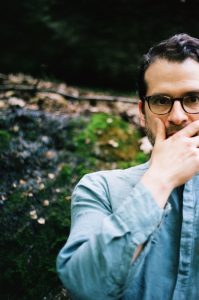
How have your career experiences or life influenced what choices you now make and the approach you now take?
I’m hungry to give answers to these kinds of questions that can help change the conversation around ongoing notions about why artists do what they do. I love it when I hear an artist clarify their previous work in a thoughtful way that gets you to see what they were trying to do in a different light. I feel really satisfied with the level to which I’ve honed my craft in music, writing and acting, to date. And it’s difficult for me to see how any of this would’ve been possible without my early career and even a lot of the explorations that I was undertaking as a young man that had preceded by early career. Before I was a club kid, I did a lot of writing and that fuels my writing today. And before Interpol blew up, I was doing a lot of synthesizer exploration which then turned into my keyboard instrumentation which I contributed to their oeuvre. And now I’m picking up where I left off there, as well.
I trained for a very long time as an actor and now when I get up and perform in front of folks I feel confident and like I’m expressing myself in an authentic way. For a while, I thought that I had to really push the idea that I was going to be this successful actor who was going to get cast in a TV show, but I realized that the reason why I was trying so hard to make that happen was because I wanted to influence public opinion about me. I wanted to do something about the way the public thought about me and that is not a legitimate artistic goal. My art is not my publicity.
Can you expand?
I always have to check this tendency of mine to try to manipulate public opinion. It strains from my time in front of so many eyeballs and when I was getting enough attention that it felt like I was having a conversation with the press and using the press to cultivate a persona. Most public figures do this sort of thing one way or another but I had to leave that all behind me as I went on these new explorations. It happens sometimes with the book I’m writing where I think “oh I should include this little bit because that’ll really help with sculpting the idea of myself I want people to have.” It’s such a pernicious and toxic element and it has no place in the creative process.
The pandemic was an essential component to the way that I rethought this whole idea. It took the world to shut down for me to abandon this type of public profile sculpture I was trying to do. Being at home and away from people made me surrender the quixotic effort to use my acting career as a replacement strategy for my old reputation. It deepened my writing craft because of all that time alone in front of the laptop. It also reunited me with something precious that I had built before I started acting school, which was my old home project studio which I’d had stowed away in boxes in storage. I took it all out and brought it to one of my bedrooms and dusted off all of my old gear and set it all back up again, replacing parts that had long gone obsolete. It’d been about ten years since I’d set up any of that recording and music production equipment and a lot of stuff had gone out of date. You should’ve seen some of the weird adaptors I had hooked up to make all the parts be able to talk to each other. But it was with the reconstruction of my project studio that I realized that one critical missing piece of my artistic palette had been ignored for way too long, the music composition side of my creative process and I’ve been going non-stop since.
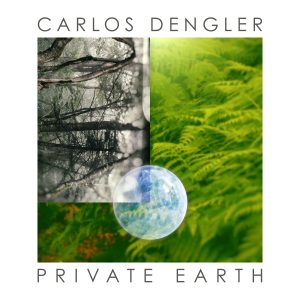
Carlos, can you share what fuelled the making of ‘Private Earth’ and what you wanted to achieve?
About half of the material dates from the time when I was composing and recording Aqueduct, my first full-length. All of my work is atmospheric and my latest is no exception. However, it’s much more acoustic and live-sounding. My goal with this record was to create a New Age prog rock hybrid where the tracks are really long, epic and layered, like prog rock, but the textures are soothing and the chord changes are extremely simplified, like New Age. My main influence on this album was Patrick O’Hearn whose albums have these types of elements. Like me he comes to electronic music by way of the bass guitar (though he was steeped in jazz while I was steeped in rock). He made his debut playing with Zappa in the late ‘70s and I think that influences his compositions in the New Age genre in their grandeur and maximalism, something that prog rock excels at.
What interests you in this genre?
I’m fascinated by the ability of really broad strokes and by decorative art. I think New Age music is sort of the aural equivalent to landscape painting, in this regard. I love how someone can buy a really well painted landscape painting and put it up in your living room and forget about it but, every once in a while, come back to it and appreciate it. Private Earth tries to accomplish this, to paint a grand scene but one that easily slips into the background, a piece of art that is not designed for full conscious engagement. In this sense, I see my music as being the opposite of, say, classical music, which on the whole is a genre of music that demands unerring attentiveness.
To me a lot of your music is very cinematic, meditative, obviously atmospheric – do you have visions for doing soundtracks?
I’ve done some soundtrack work so far and I would love to do more. I definitely see what you mean about my music. Others have made the same comment. But it’s interesting because the stuff that comes out of me as a result of scoring to picture, as opposed to simply starting from scratch, is so very different than what’s on my albums. I love scoring for this reason because it disabuses me of the imperious self-talk while I’m composing of having to ego-identify with the output. I can just say that I’m fulfilling someone else’s vision and that this music doesn’t “represent” me, it represents the need for this picture to have an underscore.
This is why I try to achieve a decorative standard for my albums. The need to decorate takes precedence over my own psychological need to express myself. It’s a healthy craftsmanship that sets realistic standards and limits and enables others to come to the output by way of how closely the music meets those expectations. It creates a context for the artist and the audience.
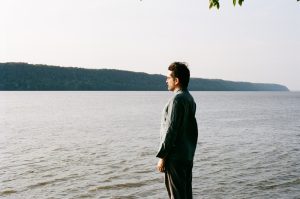
What does taking trips into ‘the wild’ do for you—you seem to enjoy being ‘off the beaten track’—how does taking trips like that improve mental health or even benefit creativity? (Assuming it does—do you get ideas with such explorations?)
This is going to seem like shameless self-plugging, but I actually just finished writing a little bit about this very part of my life in the context of the book proposal I’m crafting to acquire a deal for my coming essay collection. The following is part of the chapter outline for an essay I’m tentatively titling “Land and Water” and I think it answers your question well:
“Hiking alone in the forests of New York and the national parks of the West, I was initially gripped by a collection of fears. Fear of bears, fear of the cold, fear of starvation, fear of getting lost, fear of disappearing, fear of being forgotten, fear of being alone. It wasn’t always fun and worrying often kept me from enjoying myself. One time, hiking in the Gulf Hagas canyon of upper Maine, I happened upon a middle-aged woman standing next to a waterfall with eyes shut and the sun glowing in her face, in a state of total unity with her environment. She became my inspiration, my psychological goal. I stayed the course, despite being far out of my depths, holding on through solitary physical and psychological tests. Confronting my fears, I came to see them as irrational. The woods sublimated a lesser part of myself.
I hadn’t intended for this exposure to Mother Nature’s feminine embrace and for my achievement of a new, heathy masculinity to yield access to a new creative process. That hadn’t been the point, but it was one of the benefits all the same. Going through these trials had dynamited my psychic edifice as a miner dynamites a cliff. I returned home after every backpacking trip with precious unrefined ore to use for new creations. It was a boon for my artistic process, yielding musical, theater and literary creations that are far more reflective, meditative and vulnerable than the art of my youth.
My creative process in my early career, aligned as it was with a certain punk rock spirit, had grown from the hardened, stifling grids of the urban environment and sought, in the spirit of creative destruction, to grenade them. It was a potent form of expression and a compelling one, too.
But Nature was the next step for me. I was asking questions that couldn’t be answered in the city. It didn’t feel authentic to continue on that way. The curvature of the trees, the abolition of Euclid out in the wild, gave me access to an organic healing center within me, maybe for the very first time in my life, I learned how to relax.”
Can you provide any update on your forthcoming book? Is it a memoir? And I know these things take time, but what are you adding to your story?—You’re still very young, so maybe that has an influence on wanting to close a chapter, so to speak.
Thanks for calling me “so very young”! I was depressed up until just now when I read that in your question, so you’ve lifted my spirits for the rest of the day. You’re absolutely correct that a major element to the writing of my book—if not the most important element—is the desperate need to close a chapter. Firstly, however, I want to make sure I’m clear in saying that I’m not writing a memoir, but a personal essay collection. The distinction is material in that a personal essay demands much more objectivity than a memoir. The best essays ask deep questions that open pathways for the reader to reconsider key subjects of the human experience. Personal essays have to walk the fine line between providing autobiographical content while adhering to that definition. When they’re done well, like in the case of someone like Leslie Jamison, they are profound and exalting experiences. I aim to do something similar with my collection.
All of those questions which I will be asking in my essays—and, critically, NOT answering, because an important and beautiful aspect of essay writing is to allow questions to be asked without too much stridency and answering—are essentially geared around the question of authenticity, both in the creative process and the developmental one. It’s going to be, as well, an exploration of reflective masculinity, since so very much of my experience was motivated by questions of “manhood” and adult, male individuation.
Right now, it looks like I’ll be finishing my manuscript in December, and I expect to have a book deal by then.
Last question – about you know what (sorry, I simply had to) – what are your thoughts here and now, now you admit you feel older, about your time in Interpol?
I will always have such fond memories of that time. I experienced a lifetime’s worth of excitement and fun and exhilaration touring the globe, meeting such interesting people from all walks of life and creating music that touched the hearts of so many. As with all of the journeys I’ve gone on, life has been made all the richer as a result.
Carlos, thank you for your time.
Carlos Dengler’s new record ‘Private Earth’ is out now and you can purchase via his Bandcamp page or listen via Spotify .
You can also keep up to date with his writings via his official website, or his social media channels.
All photos by @thisismattstreet
